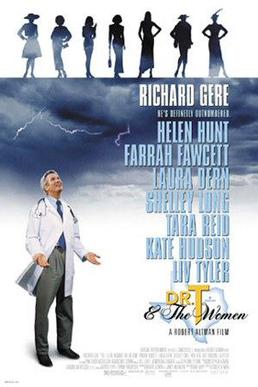Dr. T & the Women
Dr. T & the Women is a 2000 American romantic comedy film directed by Robert Altman and written by Anne Rapp. The film stars Richard Gere as Dr. Sullivan Travis ("Dr. T"), a wealthy Dallas gynecologist who finds himself surrounded by women in every aspect of his life. The ensemble cast also includes Helen Hunt, Farrah Fawcett, Laura Dern, Shelley Long, Tara Reid, and Kate Hudson in supporting roles.
Plot[edit | edit source]
Dr. Sullivan Travis, affectionately known as Dr. T, is a highly successful gynecologist in Dallas, Texas, who leads a seemingly perfect life. However, his world begins to unravel as he deals with a series of complex relationships with the women around him. His wife, Kate (played by Farrah Fawcett), experiences a mental breakdown and is admitted to a mental institution. His daughter, Dee Dee (played by Kate Hudson), is planning her upcoming wedding, while his other daughter, Connie (played by Tara Reid), harbors a deep resentment towards her sister's perfect life. Dr. T's office is always crowded with a diverse group of female patients, further complicating his life. Amidst his personal turmoil, he finds solace in a growing relationship with Bree (played by Helen Hunt), a golf instructor. The film explores themes of love, family dynamics, and the complexity of human relationships.
Cast[edit | edit source]
- Richard Gere as Dr. Sullivan Travis ("Dr. T")
- Helen Hunt as Bree
- Farrah Fawcett as Kate
- Laura Dern as Peggy
- Shelley Long as Carolyn
- Tara Reid as Connie
- Kate Hudson as Dee Dee
- Liv Tyler (cameo)
Production[edit | edit source]
Directed by Robert Altman, Dr. T & the Women was noted for its ensemble cast and Altman's signature style of overlapping dialogue and multiple storylines. The film was shot on location in Dallas, Texas, capturing the city's upscale environments that reflect Dr. T's affluent lifestyle. Anne Rapp's screenplay delves into the intricacies of women's lives from the perspective of a male gynecologist, offering a unique narrative approach.
Reception[edit | edit source]
Upon its release, Dr. T & the Women received mixed reviews from critics. Some praised Altman's direction and the performances, particularly those of Richard Gere and Helen Hunt, while others criticized the film for its portrayal of women and perceived lack of depth in exploring its themes. Despite the mixed critical reception, the film has been discussed for its exploration of gender roles and the dynamics of female relationships.
Themes[edit | edit source]
The film delves into themes such as the complexity of female relationships, the challenges of communication between genders, and the search for identity within family and professional life. It also touches on issues of mental health, marital strain, and the societal pressures faced by women.
Search WikiMD
Ad.Tired of being Overweight? Try W8MD's physician weight loss program.
Semaglutide (Ozempic / Wegovy and Tirzepatide (Mounjaro / Zepbound) available.
Advertise on WikiMD
|
WikiMD's Wellness Encyclopedia |
| Let Food Be Thy Medicine Medicine Thy Food - Hippocrates |
Translate this page: - East Asian
中文,
日本,
한국어,
South Asian
हिन्दी,
தமிழ்,
తెలుగు,
Urdu,
ಕನ್ನಡ,
Southeast Asian
Indonesian,
Vietnamese,
Thai,
မြန်မာဘာသာ,
বাংলা
European
español,
Deutsch,
français,
Greek,
português do Brasil,
polski,
română,
русский,
Nederlands,
norsk,
svenska,
suomi,
Italian
Middle Eastern & African
عربى,
Turkish,
Persian,
Hebrew,
Afrikaans,
isiZulu,
Kiswahili,
Other
Bulgarian,
Hungarian,
Czech,
Swedish,
മലയാളം,
मराठी,
ਪੰਜਾਬੀ,
ગુજરાતી,
Portuguese,
Ukrainian
Medical Disclaimer: WikiMD is not a substitute for professional medical advice. The information on WikiMD is provided as an information resource only, may be incorrect, outdated or misleading, and is not to be used or relied on for any diagnostic or treatment purposes. Please consult your health care provider before making any healthcare decisions or for guidance about a specific medical condition. WikiMD expressly disclaims responsibility, and shall have no liability, for any damages, loss, injury, or liability whatsoever suffered as a result of your reliance on the information contained in this site. By visiting this site you agree to the foregoing terms and conditions, which may from time to time be changed or supplemented by WikiMD. If you do not agree to the foregoing terms and conditions, you should not enter or use this site. See full disclaimer.
Credits:Most images are courtesy of Wikimedia commons, and templates, categories Wikipedia, licensed under CC BY SA or similar.
Contributors: Prab R. Tumpati, MD

